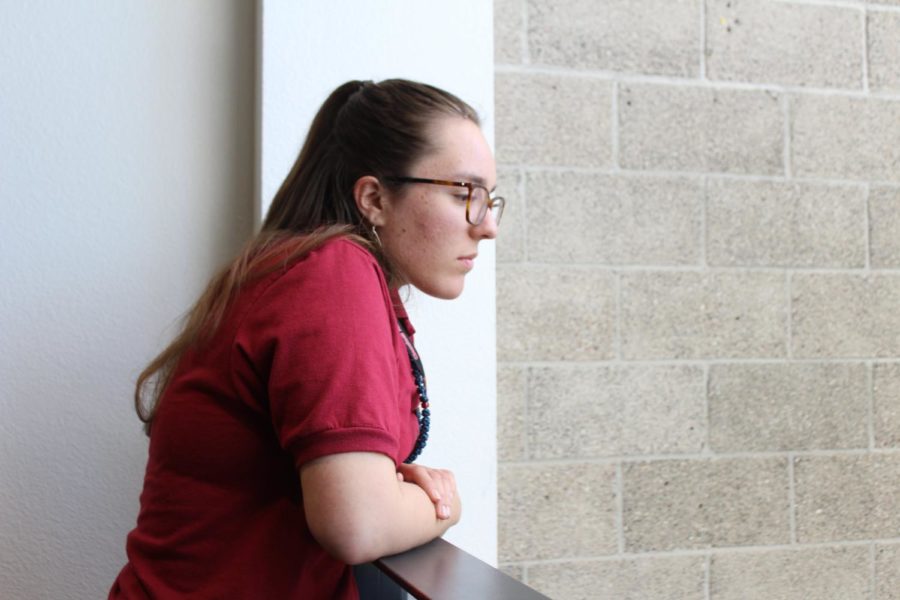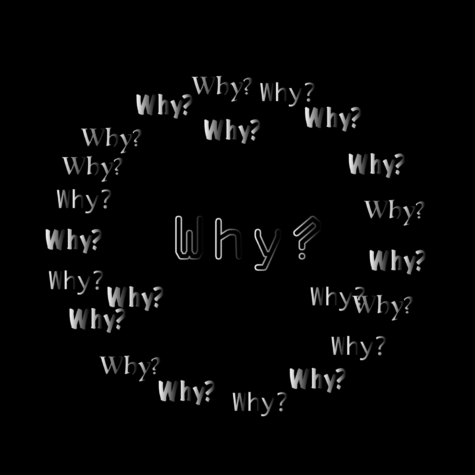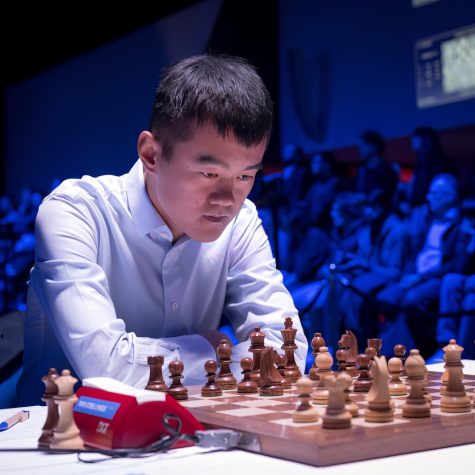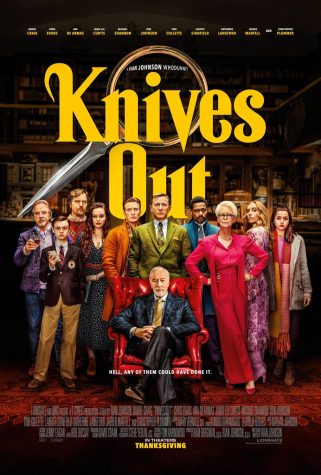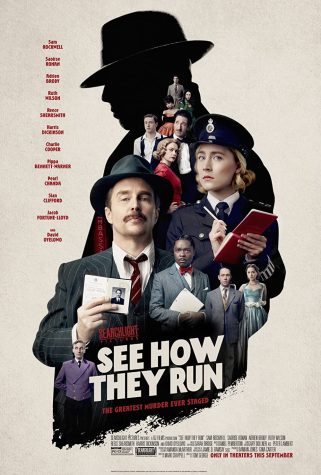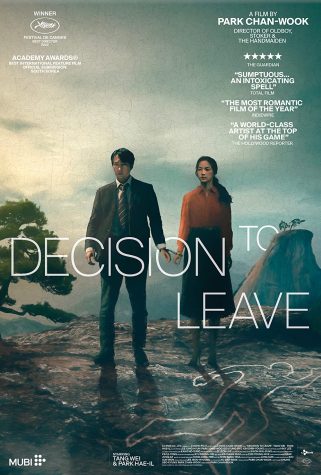The Decider: A Tribute to AP GOPO
The air conditioning isn’t working again, but that’s not the only reason I can’t breathe here.
There’s a restlessness itching my bones and a burning cold adrenaline radiating from my chest. And the combination is like a hammer, tap tap tap tapping. There’s no stopping it. I know this.
I know something else, too: If I leave now, nobody will notice. I’m just that dispensable.
So I grab my pass, and I go. I don’t hear the door shut behind me. I’m not listening for it.
Everybody always talks about how crowded our hallways are, but I’m almost sure that’s because they’ve never seen our hallways like this. Right now, everybody else is too busy staring at walls and phone screens and their own closed eyelids trying to pay attention to something else.
And they’ve got it all wrong. Because the best way to pay attention is to detach completely. It’s standing in a crowd of movement and being still, standing in the loud and the hollers and the shouts, and being completely silent. It’s being here, but not being here. Not really.
I’m not here. Not anymore. And because of that, there’s so much to see.
There’s a smacking sound as the soles of my feet slap the insides of my sandals. If I were still a sophomore with boots, it’d be a sharp set of clicks instead, a gait timed to the pulse of my perceived power. I always felt like a totalitarian dictator in those boots.
See, that’s what I always think about in these hallways. Not where I’m going, but where I could be. And somehow, I get where I’m supposed to without getting lost.
I think, though. I think too much. Because, especially when the hallways are empty, I’m thinking of power and influence, and how, in the hallways, I’m always cognizant of what I control, or upset at what I can’t.
I pass by one of my classes, and I’m thinking about hall passes, and how I don’t need them because my teacher said not to use them. “They know who you are,” my teacher said.
I wish so. I wish they did.
Sometimes, I leave this class, just to wander. I leave this class and, in my mind, I walk into another. I invert the natural order of my world, if only just for third period. It’s a powerful thing.
Nobody sees that, though. I’m a CDO1 to them, you know? I’m pooled assets of everyone else’s emotional debt, the promises everyone makes and forgets about. And people trade me cookie-cutter words of affirmation in exchange for pieces of me when they know their promises aren’t good, and they know their word is worse. And despite the instability of their promises, everyone’s always betting on me to follow through, but nobody knows where to put me or how to categorize me or where I fit, because nobody knows what I’m made of. I’m bits and pieces of everything nobody wants, because that’s how I feed myself, and you are what you eat.
None of it’s any good. But I must be worth something, because I have straight As. And everyone trusts the rating agencies called the gradebook, because aren’t they infallible? My chance of defaulting is dangerously low. But what people see as smart and steady, I see as a disaster waiting to happen, because I know what nobody else knows: the past six years of my life have been the Biggest Short.2
It’s a disaster. But, hey — maybe, after all of this, I do know something about economics.
I can’t say this confidently, though. I can never say what I actually want to, because I get scared, and everything comes out clipped or abbreviated or redacted, and it doesn’t sound as serious when it’s trimmed down, even though I wish the things that came out of my mouth were important. I’m tired of still feeling like an underclassman, and being unsure of my own voice and my ability to contribute even though I’ve been here for four years.
Maybe it’s just me, but nobody seems to care. So when I turn my gaze to the ceiling of the hallways as I walk and I breathe the silence and light into my lungs, I pretend that I’m too powerful to be dependent on the support of other people. I feel too vulnerable around everyone, so I pretend to be invincible. I feel threatened, so I pretend to be superior.
The act is painful. But it never gets old. And it wears me out. But so does everything else.
And here I am, dreaming of change and all the ways I could seize it. Hoping for activism, and knowing I’m too scared to ever protest, because I don’t think anyone would join my cause. I lack efficacy3 in the politics of my own life because I lack civic competence4 in the policies governing my own destiny. And I don’t believe anyone would miss me. And yet still, hypocrite that I am, I dream to be appreciated.
I wish I could issue a writ of mandamus5 to the world. And I already know what it would say: Notice me.
But I wonder if that’s even under my jurisdiction, or if I’d have to ask the Court. And it hears less than 5 percent of all appeals, so I’m stuck. I doubt they’d grant me a writ of certiorari.6 Why would they give me a chance if no one else ever really has? There’s no precedent7 for me.
~ – ~
You did. You gave me a chance. I remember.
“Talk to me, goose.”
But see, that’s hard, and you don’t know it. The moment I’m called on, I’m mute. And maybe I know something, but I trick myself into thinking I don’t know anything. So I don’t speak up because I really don’t want to answer.
The strangest part is that, if I’m bad at giving answers, I’m even worse at obtaining them. And I’m a journalist, so, unfortunately, finding answers is kind of my job.
Maybe I’ll master the balance someday. I just wish my voice were softer in my head, and louder on my tongue.
There was this one time — I don’t remember what we were talking about, but there was this one time where I asked you a question, because I’m always asking questions, but not all of them get answered, because I don’t always ask them loudly enough. I don’t remember the question — only that I was asking for permission to do something. And you shrugged, that shift of a head tilt to the side. “You’re the decider,” you said.
And I don’t get any of your movie references the same way you don’t get any of my excuses for jokes, but I stiffened again, because I think I got that one. President George W. Bush, right? Not that I remember much about his presidency. Robin Williams did, though; I got that from one of his comedic routines. He referred to Bush as “a man who said, ‘I’m the decider.’”
Williams’s commentary? “No, sir, you’re the president; you make decisions. ‘Decider’ is what they sell in the little jugs.” Which I never quite thought was as funny as everything else in that routine. (His comment about Monica Lewinsky? Brutal.) But ah, well.
“He also said, ‘I am misunderestimated.’” Williams, mocking Bush, smiles, laughs and says, “Oh, no, not really.”
But I am. I am misunderestimated. I, at least, misunderestimate myself. It’s not a real word, but does it have to be?
In the wake of the grenade you threw me, I looked up at you with widened, burning sleep-deprived eyes and a collapsing throat. “I don’t want to be the decider,” I said. I hoped you knew I’d gotten the reference. Somehow that was important to me.
As I wander the halls, I realize, as with many other things, that you’re right. I don’t want to be the decider, but questions must be answered. AP or non-AP? Sleep, or homework? (Guess which one always wins. Just guess.) Full credit on this online article rubric, or do we deduct points because there’s no featured image?
And then there are other things. Other people decide what to wear and which color they’re dyeing their hair and whether they’re taking AP exams and where they’re going for senior lunch.
And then there are other things.
Everyone else watches the digital clock like intense scrutiny can make the bright-green digits increase with faster-paced blinks, and they just want out. They squeeze through the hallways they share with me, not watching where they’re going, and not really caring either. And arriving at my destination is another exercise in advocating for myself.
But often I don’t feel like I’m moving, even when I am — just not anywhere fast. Often, in my head, I’m standing still, and I’m watching everyone clump together and clog the walkways and make smalltalk on the way to fourth period, and everybody has questions for each other.
Often, when I’m standing — the roadblock that’s never really there — I stand, and I watch, and I think, Should I stay, or should I go?
Everyone decides, I guess. And I need to decide, just not the same things they need to decide. I need to decide to show up. To class. To prom. To choir practice. To life. And in the hallways, I can fantasize about showing up, while, simultaneously, I can disappear.
Only now, there’s no one here. So there’s nowhere to disappear but into my own head. It’s always crowded in there. I have constant company.
But I’m learning something, after so many days where even breathing feels like life’s most monumental challenge. I’m learning disappearing is dangerous, and just because people can, doesn’t mean they should.
So I break out. I leave, and I don’t need a hall pass this time. I don’t hear the door shut behind me. I’m not listening for it.
If I walked into the admin side of the building, past the new water fountain that doesn’t work and toward the staff lounge, I could probably run into at least one teacher I know. Maybe I’d have to ask them to open a water bottle for me, because it’s stuck again and my wrists are weak.
Or maybe I’d see another student I could wave to. Most often, though, I take the scenic route, where I can gaze into all the classes I can see, but not hear, mute microcosms that categorize and compartmentalize my education. World History. Gov and Econ. Pre-AP English. U.S. History. Spanish. It’s all there, and I can see everything.
I think of all the years I’ve spent walking these halls, and how I’ve felt like they’ve always been mine, even when I’m sharing them. I think about how, even though I won’t see them anymore three months from now, these people are mine, too. They own a part of me, a stage of my life that’s forever a piece of my memory’s puzzle. And so many have helped push the pieces so they click into the right places.
Over the past four years, I’ve spent more time here than I have anywhere else. There are so many memories, and I’m grateful for all of them.
See, when I think back, I remember being happy. And when I walk these halls, there’s peace and stillness, and I am content. And that’s a privilege, but I forget sometimes but it’s my right to be happy.
I have a right to many things, I’m learning.
I feel like Miranda8; I don’t know my rights. So maybe I should learn them, because I need to stop denying myself those rights. No double jeopardy9 for the crimes the rest of the world has long since acquitted me of. No self-imposed habeas corpus suspensions or self-issued bills of attainder11, because I’m hard enough on myself as it is. No ex post facto laws12, because the past is the past, and I can’t change mine.
I need to stop inflicting upon myself such cruel and unusual punishments13 as shame and guilt and anger and hopelessness. That’s unconstitutional. No matter what Gregg v. Georgia14 says.
I pass by a teacher’s classroom, and I wave through the window as I walk. Sometimes, if I’m lucky, they’ll see me and smile and wave back.
I’m not lucky, though. I’m blessed. I need to remember that.
I reach the steps — and a dilemma: take another lap, or head back to class? And I know this time, I must decide.
I think of this place, and how it feels like home, no matter where I wander here. But then I think of the people who make it home, the ones who make this a home worth staying in.
“You’re the decider,” you tell me again. So decide.
And the moment I grin, I know where I’m headed.
I belong in class. It’s where I’m supposed to be, sure, but I can make it mine if I try. I can make jokes, and I can make connections. I’m a body in a chair at a desk, and I’m a voice in a Socratic seminar, and I’m a black ballpoint pen scratching furiously at slightly-crumpled lined paper. And I’m a shadow made dimmer by sleep deprivation, or I’m fireworks.
I can’t choose my environment. I can’t always choose where I need to be. But I can determine what role I’ll play where I’m at, because I can control that. My reaction is all up to me.
So I head back to class, because I choose to be seen. Because I choose to see myself.
Because, at the end of the day, I am the decider. And I choose. I choose.
Footnotes:
1A Collateralized Debt Obligation, or CDO for short, is a “package” of pooled assets used as collateral in investment banking. These CDOs are placed into various categories called “tranches,” which indicate the stability of those assets. In very brief summary: Along with credit default swaps, CDOs were used to help finance and substantiate subprime mortgage loans, which helped expand the housing bubble and contribute to the 2007-2008 financial crisis.
2A second reference to Michael Lewis’ “The Big Short,” a book featuring several of the individuals who were able to predict the 2007-2008 housing crisis and bet against the market, thus profiting when the market finally collapsed. To “short” something is to borrow shares and then immediately sell them in the hopes that you can borrow those shares later at a lower price and profit off the difference when you return the now-cheaper shares to the lender (marketwatch.com). However, in the context of this story, “the Biggest Short” refers more to the idea of betting against shares once you realize they’re unstable than it does to actually shorting shares.
3 efficacy: citizens’ ability to enact change in their government
4 civic competence: a citizen’s confidence in their ability to enact change in their government
5 writ of mandamus: a court-issued order to a lower government official instructing an official to behave in a certain manner or to correct some abuse or misbehavior that official has committed.
6 writ of certiorari: A writ of certiorari is the Supreme Court’s decision to “pull” a case out of a lower court when it determines to hear that specific case. Only the Court can decide to which cases it issues this writ, thus allowing the Supreme Court to build its own docket of cases (with the exception of cases in which the Court has original jurisdiction).
7 precedent: a previous court case with similarities to the current case. The courts use the precedent’s to decide its ruling on new and similar cases resembling that prior case, resulting in “stare decisis.”
8 In the case Miranda v. Arizona, the appellant claimed that Ernesto Miranda’s Fifth Amendment rights were violated during his police interrogation, as he was never informed of those rights (including the right to protection against self-incrimination) during his interrogation, wherafter he confessed guilt for the crimes he was accused of. The federal Supreme Court ruled in Miranda’s favor, saying that any statements obtained during an interrogation wherein the accused was not fully informed of their rights could not be used by the prosecutor during a trial because this would violate the accused’s Fifth Amendment rights. Because of this case, the rights an officer reads to you when arresting you (starting with “you have the right to remain silent”) are referred to as “Miranda rights.”
9 double jeopardy: being convicted twice for the same crime
10A writ of habeas corpus mandates that you be brought before a judge and told why you’ve been arrested and you can be released if the grounds for your arrest are not justifiable. Such a writ prevents a person from being kept in prison indefinitely without knowing why they have been arrested and what crime they are accused of.
11 A bill of attainder allows the accused to be declared guilty and to be punished without a trial.
12 An ex post facto law is any law that makes a certain act illegal even though that act was legal when it was committed; any law that changes the punishment for a crime after the crime has been committed or any law that changes the definition of a crime after the crime has been committed. Ex post facto laws allow for a person to punished for “breaking the law” even though whenever the person committed the “crime” in question, it wasn’t a crime. These kinds of laws are forbidden by the Constitution.
13 Under the 8th Amendment of the Bill of Rights, cruel and unusual punishments are unconstitutional and cannot be inflicted (along with excessive bail).
14This case ruled that the death penalty isn’t always “cruel and unusual punishment,” and, thus, isn’t always unconstitutional.
EDITOR’S NOTE: On 4/29/18, footnote 3 was updated to more accurately reflect the definition of political efficacy.
On 7/19/18, “shoes” was changed to “feet” because wearing sandals over other shoes sounds not just like a terrible fashion choice, but also sounds anatomically impossible.


